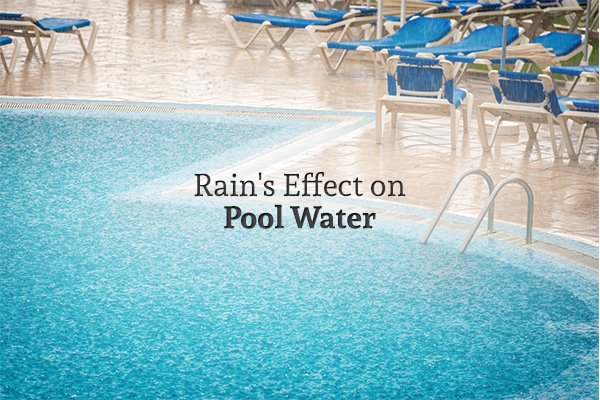
Rainfall has an important impact on swimming pool water. Drizzles, showers, and downpours do more than fill your pool with a little precipitation. People who own or maintain swimming pools in the DFW Metroplex should monitor the chemical balance of their pools during the rainy season.
The Physics of Rainwater
Rain occurs as evaporated water accumulates in clouds. The weight of the water grows during convection, as temperature and other conditions allow warmed water vapor to rise and condense. The droplets that form in this process weigh more than the vapor. When the cumulative weight of the droplets under these conditions reaches a point of saturation, gravity completes the water cycle by returning this moisture to the earth in the form of rain.
When rain falls, the fresh water often collects fellow travelers in the air. Dust, dirt, spores, and other small or microbial particles attach to the droplets. The presence of those other materials along with the rain is part of a natural process that has existed since the beginning of time, though due to the effects of industrialization and urbanization, other small microbes and chemicals may also attach to the droplets.
By the time these raindrops find their way to your patio and pool, they carry millions of these particles. Even if they fell alone, the presence of this accumulated rainfall would alter the chemical balance of the water in your pool. When storms and downpours are accompanied by strong winds and unstable conditions, larger debris—such as leaves and other organic materials—may fall into an unprotected or uncovered outdoor pool and affect its chemical balance.
How Does Precipitation Affect a Pool’s Chemical Balance?

Whether from a brief drizzle or a long downpour, rainfall that reaches your pool changes the chemical balance of the water. When rain water dilutes the chemicals we add to your pool, the ability of those chemicals to sanitize, oxidize, and keep your water properly balanced diminishes.
If you own a pool that is subject to the elements, you should test the chemical levels within this body of water after a storm or significant rainfall. By doing so and adjusting the chemical balance as necessary, you will assure that this popular destination at your home remains safe and free from contaminants.
Why Is Maintaining Your Pool’s pH Balance Important?
The pH balance determines how the water within your pool affects the skin, eyes, and other areas of the body. Since years of pollution have introduced high levels of carbonic and sulfuric acids into the atmosphere, rain that falls within the DFW area and nearly all of the United States is acidic. These acids lower the pH within raindrops, so rainfall accumulation in a pool increases the water’s acidity.
The pH balance within your pool should fall between 7.2 and 7.8, a range comfortable for our bodies. If the pH dips below this range, you will experience skin irritation and damage to your swimwear. Maintaining the proper pH balance is a delicate dance, since a higher pH weakens the effectiveness of the chlorine to do its job. Keeping your pool’s pH and chlorine balance within the proper range allows the chemicals to fight contaminants while keeping the pool safe for your use.
Does Precipitation Affect Other Parts of the Pool?
Since rainfall changes the total alkalinity and pH balance of the water in your swimming pool, your water can steadily become more acidic. As the water becomes more acidic, it has the potential to corrode metal surfaces that come into contact with the water, such as:
- Rails
- Ladders
- Pool Lights
In addition, water that falls below the proper pH balance may damage pool equipment, such as:
- Filters
- Heaters
- Pumps
Lower levels of total alkalinity also increase the potential for algae to grow in your pool.
Will Rainfall Change the Calcium Hardness or Amount of Total Dissolved Solids in My Outdoor Pool?

Although precipitation will not have a direct effect on the amount of total dissolved solids or calcium hardness in your pool, runoff that accumulates in nearby areas may pose a problem. If rainwater on the deck drains or washes into your pool, it may include dirt and other minerals from the ground. These miniscule solids may significantly increase the level of dissolved solids and cause calcium hardness to occur.
Runoff from the patio and adjacent ground sources changes the pH and total alkalinity levels as well.
What Effect Does Precipitation Have on Salt Water Pools?
Rainwater that falls within these types of pools will dilute the amount of salt. After periods of significant rainfall, the pool owner should restore the pool’s salinity balance to a proper level by adding salt as necessary.
Does Rainfall Promote the Growth of Algae in Outdoor Pools?
Although rain falling from the earth does not directly lead to the growth of algae, accumulations of rainfall in the areas surrounding an outdoor pool may affect it. The nutrients, nitrates, and phosphates within fertilizers keep your grass green and gardens growing. However, these same nutrients that promote lush landscaping can also create an ideal environment for algae growth.
After periods of significant rainfall, be sure to run your pool’s filtration and pump system for at least 24 hours to remove dirt, fertilizers, and other organic debris. You should also consider adding a weekly dose of algaecide to your pool water to inhibit the growth of any unwanted green matter.
Prevent Rainy Days from Ruining Your Outdoor Oasis
Through the variety of cleaning, maintenance, and algae removal services we offer, Liquidus Pool Services allows you to “Take Your Weekend Back” and enjoy safe swimming throughout the year. Swimming pool owners throughout the Dallas-Fort Worth Metroplex can count on Liquidus Pool Services for their construction, renovation, repair, and service needs. Contact us today!
